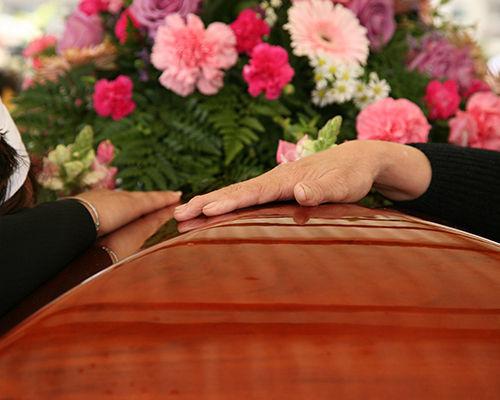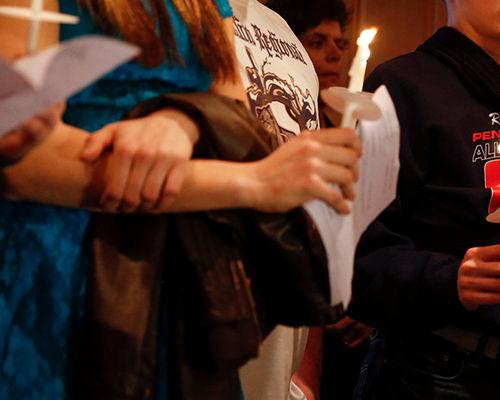What they say for 40 days for the deceased. Funeral poems, words and toasts.
Funeral speech at a funeral text - farewell words, expressed in memory of the deceased by his family and friends. They are pronounced over the grave of the buried with all their hearts. The speaker talks about important and significant events associated with this person, his achievements, and also speaks on the good side about the character and personality of the deceased. It is advisable if he says this orally, and not reads it from a piece of paper.
Funeral speech
Quite a lot of people attend funerals and wakes. Mostly these are relatives and friends of the deceased, but there are others - colleagues, acquaintances, friends from school and others. As a rule, it is the head of the family or the eldest who is the first to pronounce the funeral words. to a loved one. If he is in a strong emotional state, then others present can speak at the wake.
Funeral speech example:

“My grandmother was a wonderful person with a difficult but interesting life. Her along with three younger brothers and her sister, her mother raised her alone in difficult post-war years. To say that they lived poorly then means nothing.
say. She had to endure many difficulties and hardships, but she never lost her optimism and presence of mind, constantly helping her mother and taking care of the younger members of the family. And later, having married her military grandfather, she steadfastly endured all the hardships of service. In any circumstances, she always maintained exemplary order at home and taught all family members to do so. Grandma was sometimes strict, but fair. I am glad that I managed to learn from her neatness and order, the ability to organize my life. And her famous apple pies were simply incomparable, no one else could do them! I will always remember you, my dear, beloved grandmother! Your warmth, love and care will remain with us forever.”
If people around you don’t know you well, then at the beginning of your speech you should introduce yourself and explain under what circumstances you met the deceased. The funeral speech should contain words of gratitude towards the deceased and reflect his positive qualities. You can mention any significant moment that occurred with the participation of the deceased.
Funeral words for 40 days:

“I’ll introduce myself for those who don’t know me:
my name is (name). We have worked together with (name of deceased) for the past few years and I would like to say a few words in memory of him. He was a true professional in his field, a specialist with capital letters. Many of our colleagues, young and not only, learned the basics of their craft from him and often used his advice and help. He was very patient and responsive, he could always listen to everyone who turned to him for support, advise something, help out, and never refused anyone’s requests. He could perfectly lift the spirits of anyone who was upset, confused or depressed about something. The countless funny stories, toasts, jokes and anecdotes he told could amuse anyone. We will all greatly miss him at our dinner gatherings and corporate events, where he invariably shone at the table, lifting our morale. There is no other person like him in our team. And maybe it won’t be in my memory anymore. We will all miss him greatly. Until the end of his life, he will remain in my memory and the memory of all our colleagues as an example of perseverance, sparkling cheerfulness, activity and professionalism! Rest in peace dear colle
It is advisable if you prepare the words for the wake in advance and memorize them. Because a well-formulated text will sound good and be perceived by others. And sluggish, boring speech with hesitations can be regarded as disrespect for the deceased and his family. If you are afraid that you will forget the words, you can take with you a piece of paper with a sample of the funeral speech. You need to pronounce words clearly and slowly. You need to speak confidently and so that others can hear you, but not too loudly.
Speech at a wake examples

Funeral words on the anniversary of death (from a colleague):
"Friends! The deceased worked honestly at the (name) enterprise for more than twenty years. We all knew him as a decent, honest and modest person. They were valued for their skillful hands and reliable character. We will miss his many invisible but irreplaceable contributions to the work! The bright memory of him will remain in our hearts!”
Speech at the wake 1 year (from friends):
“Friends, the best of us has gone to another world. We are all deeply saddened. Our souls are bleeding from untimely loss. The deceased was a support to all of us. He was the first to help, did not wait for requests or
complaints. His kind heart and wide soul were always open. He was a clear beacon and guide in the complex and dangerous world for all of us, his friends! May the soul of this magnificent man rest in peace! We will always remember him with a feeling of light sadness mixed with secret melancholy!”
Memorial speech for 40 days (from relatives):
“All his life, our father was a worthy example not only to his children, but also to those around him. In everyday life, he demonstrated a wise understanding of true values, kindness and devotion. Any person left him with an enlightened soul. And to us, his children, our father instilled a love for people, a high sense of responsibility and devotion to the Motherland. We consider his departure unfairly early. Eternal to him bright memory!»

“Our grandfather was very kind and a good man. His path was long and difficult. He perceived all the difficulties that befell the country as his own. He worked and raised children without complaining about the lack of benefits, lack of food or amenities. He raised children and was a support for his grandchildren. This magnificent man will be greatly missed by all of us. May his memory be blessed!”
Words of condolences are expressed not only in
the time of funerals, but also on days of remembrance of the deceased. They say a speech at the wake 40 days, a year after the date of death, and also during Parents' Saturdays and others Orthodox holidays. Speeches can be made both at the cemetery and during funeral dinners.

What do they say at wakes?
At this event, all deceased relatives and friends are remembered. They remember what they were like during life, what they were interested in, what they loved. Words of condolences are spoken and the blessed memory of the deceased is honored. It is forbidden to say anything bad about the deceased or to recall old grievances. It’s either good or nothing, says the popular saying.
At the hour of remembrance, until the pain of loss has subsided, the first thing to remember is this delicacy. Find out how to choose words of condolences, read examples of words of condolences and obituary rules. These guides will give you an idea of ethics of remembrance and they will tell you true words of consolation.
But funeral speech has its own specifics. In it you address to a whole circle of guests who gathered to console loved ones, remember the deceased themselves and listen to what friends and relatives had to say about him. Your words are awaited, and yours funeral speech may sound with b ABOUT greater pathos than is customary for personal expressions of condolences.
Words of grief directly at the funeral should be extremely brief, but speech at the wake may not be limited to a couple of phrases.
Funeral words of grief and funeral speech
First, introduce yourself and, if it is not obvious to everyone, say who you are related to the deceased. Many people will speak at the wake. That's why funeral speech should be concise, and thoughts are expressed accurately. Guests will understand if the sentence is interrupted by sudden crying. But unpreparedness, verbiage, and even more so drunken babble, will be perceived by those gathered as a sign of disrespect for the deceased. Don't rely on improvisation! Have brief theses with you, and at home or on the way to the funeral ceremony, repeat your funeral speech several times.
Don't retell the biography - enough tell about one bright incident, an episode of life so that guests remember this interesting fact. It is important that the event you describe highlights one of the positive traits deceased. It's better to talk about that episode which you yourself highly appreciated. Study examples of how celebrities are remembered by their loved ones (each obituary contains an episode from life and condolences).
Focus the audience's attention on the character trait that your story demonstrates. Every negative trait has a bright side. Examples of complementary synonyms:
- About a grumpy person you can say, “He taught me a lesson in looking at the world critically.”
- About the tight-fisted one: “Caution, rationality and foresight are what we all lack today, and what we can learn from the deceased.”
- Carelessness in finances: “He was so confident of a better future...”
- Suspiciousness: “Knew human nature...”
- Not very smart: “Trusting, naive, he trusted people so much...”
- Arrogant: “He knew his worth, his circle included only the best...”
- Stubborn, stubborn: “Principled...”
- Amenable, without a core: “Conflict-free... His credo is compromise.”
At a wake you cannot talk about shortcomings: “ About the deceased it’s either good or nothing" - this is the basis of the etiquette of remembrance. You should not remember, especially out loud, about failures, weaknesses, sins and grievances. Forgiveness, reconciliation, remembering better things- this is the necessary aura of the memorial ceremony.
Words of Sorrow It is appropriate to supplement with a quote from the thoughts of the deceased: an order, instruction, commandment or moral maxim that he voiced during his lifetime. Then the funeral speech should begin with a mention of the benefits that he brought to loved ones and society. Conclude that the person did not live his life in vain and promise eternal memory in the hearts of the relatives and friends of the deceased.
“May he/she rest in peace! Everlasting memory!" You can end your funeral speech with these words, but many will do this. It is better to choose an appropriate epitaph that is in tune with the personality of the deceased:
- If you or the deceased are believers, look here: religious epitaphs, Christian epitaphs, epitaphs, prayers or phrases from the Bible.
- If, on the contrary, the deceased is a consistent atheist, then here.
- For the deceased of a philosophical mindset - here, as well as epitaphs about the meaning of life.
- There are many beautiful ideas for words of grief in universal ones or in epitaphs on behalf of the deceased.
Protocol of commemoration
At a wake you need to stand and honor the deceased. minute of silence. The leader’s mission is entrusted to a person close to the family, who will be able to control his emotions in a mourning environment. He alternately gives the floor relatives according to the degree of proximity - spouse, children or parents, immediate relatives, and then friends of the deceased.
The presenter should prepare several phrases in advance to remove the pause and redirect the attention of the guests if the speaker’s speech is interrupted by tears. Funeral words are usually pronounced standing.
Orthodox Christian tradition of remembrance
If the deceased was a believer, then a funeral should be held according to church customs, in compliance with church rituals. Speeches and prayers are key components of a Christian memorial ceremony. After praying for the repose of the soul of the deceased, the leader of the ceremony should thank all the guests for coming to the wake and praying for the soul of the newly deceased. Funeral speeches pronounced when everyone has already gathered at the table.
In the Orthodox Christian tradition, the funeral begins with Psalm 90 and the “Our Father” prayer. The atmosphere at the table is restrained; you need to talk quietly, in a half-whisper. The first word is given to the head of the family. Then the funeral is led by the head of the ceremony - a person respected by the guests and close to the family. Funeral words at Orthodox funerals pronounced according to seniority. Everyone who wants to speak can and should have the floor.
Funeral toasts* at Orthodox funerals end with the words: May [Name] rest in peace and may the memory be eternal! Everyone drinks without clinking glasses and bowing to the portrait or empty seat of the deceased.
*Alcohol is not included Orthodox tradition commemoration. But the practice of remembering “without clinking glasses” is deeply rooted among the people. It is important to observe moderation!
In Orthodoxy it is known that, thanks to prayers, funeral services and other Christian rituals, the tossing soul of the newly deceased becomes easier. A kind, warm word from family and friends pacifies the soul of the deceased and dulls the grief of loved ones. At the end of the commemoration, rising from the table, each bows to the portrait or towards the place of the deceased. When leaving, they express sympathy to their relatives. It is not customary to say goodbye at a wake.
Poems for funerals? Yes, but delicately and in moderation.
When expressing condolences in person, face to face, it is undesirable to turn to the verse. Read a poem gathered at a common table friends of the deceased are allowed - after all, everyone expects mournful sayings, memories and some pathos. Possibly in verse. The main thing is that the rhyme is not vulgar, that it reflects the best features of the deceased and corresponds to the moment. And there was brief. Or very brief.
Example of a funeral speech
In order not to be constrained by the “correct” but inappropriate speech, we instead concrete example We will propose the optimal structure of the funeral word with example phrases.
Appeal:
- Dear friends and relatives of [Name]!
- Dear guests!
- Brothers and sisters!
- Dear family and friends of our beloved [Name]
Personal positioning in relation to the deceased(modestly):
- I am the nephew of our revered [Name].
- I am the brother of [Name] whom we remember today.
- [Name] and I have worked/served together for a long time/recent years.
About the mourning event(news of death or memory of a funeral):
- My father was ill for a long time; we understood what would happen, but when we got a call from the hospital...
- When I found out that [Name] died, I couldn't think about anything else that evening.
- Although grandfather lived long life, the death message shocked me.
- Today is 40 days since my mother left us.
- A year ago we said goodbye to [Name], a respected and worthy person.
Few words about the best qualities of the deceased:
- Grandmother was the kindest person, a hospitable and hospitable hostess.
- She has been a support and reliable support for her deceased husband for five years now.
- He was known as a joker and an optimist; it was easy and carefree to be with him.
- He gave confidence in the future and was a support for those around him.
Quote a command, advice, or moral value that the deceased encouraged family and friends to follow. Then, in a few sentences, tell about a significant incident or episode of life, which illustrates a positive quality of the deceased. It's good if this one is yours short story will complement the mosaic of opinions of other guests of the wake. End it by remembering the deceased with gratitude or admiration for this personality trait.
Close your speech with a promise of eternal memory. In conclusion, it is permissible to use rhyme, and, if the newly deceased was a believer, and there are many Christians among the guests, then end the funeral address with an epitaph-prayer. Keep it short: long speech is difficult to comprehend. And all guests of the ceremony should be allowed to speak.
A funeral speech is given at funerals, wakes and anniversaries of death. The first to speak funeral words were the inhabitants of Hellas and Ancient Rome. The higher the status the deceased had during his lifetime, the more people wanted to speak at his funeral. Most likely, it was then that one of the requirements of oratory was born - brevity, because some speakers were very keen on listing the merits of the deceased.
Photo of the funeral speech
The highest aerobatics of a high-quality funeral speech are funeral poems. Cause? Firstly, this genre is not accessible to everyone. Secondly, a high-quality literary work composed on such a sad occasion makes a huge impression on the public. Thirdly, it is the memorial speech delivered at a memorial service, funeral, commemoration, anniversary that will give the event the solemnity and spirituality necessary in such cases.

Photo memorial poems
Funeral poems can be composed by relatives with literary abilities, or special authors working in this genre.
How to write a funeral speech
The structure of a funeral speech is not much different from an ordinary speech, therefore it is compiled according to the same principles as ordinary literary works intended for public reading.

Photo of the memorial speech
What should you not say at a funeral? Firstly, list the negative traits and actions of the deceased. Secondly, delve into history and the epistolary genre. A cemetery or a building intended for a civil funeral service is not the most suitable place for practicing oratory. Since ancient times, brevity, pithyness and brightness have been considered the most important qualities good funeral speech.
Unlike funerals and civil memorial services, speeches at wakes can be more “spread out” and longer. This is due to the fact that people gathered for the funeral feast are sitting at a table, in a room protected from the vagaries of the weather, so a long, drawn-out speech at a wake will be received more favorably than at a funeral.
In addition to the written speakers, anyone present can express kind words about the deceased at a memorial service. Due to the fact that the atmosphere there is more intimate than at a funeral, even those who have minimal experience in public speaking take up the funeral toast. By the way, ordinary toasts are not made at a wake. Therefore, an attempt by guests to make a toast can be interpreted as disrespect for the deceased and the house in which people gathered for the funeral feast.

Photo of speech at the wake
Due to the fact that the most significant type of commemoration of the dead is considered to be “forty days” - the day of determination of the soul, memorial verses for 40 days are especially appropriate. You can order them from a professional author or write them yourself.
Another option for works in the memorial genre is memorial words for the anniversary of death. After a year has passed from the date of death of a particular person, relatives can tell what has changed in their lives and sincerely regret that the deceased is not with them. If the anniversary commemoration is a family event, then memorial poems for the anniversary of death can be published in a newspaper or read out on a thematic broadcast on radio or TV.
Death is grief and pain for the loved ones of the deceased. Natural consolation is the desire to help, to facilitate the deceased’s transition to other facets of existence. According to the Christian religion, the 40th day is considered the most important of all memorial days, because during this period the soul says goodbye to the earth forever and leaves it. Many people organize a wake for 40 days after the death. What to say on this day and how to behave?
What is the meaning of a funeral ceremony?
It is important to know that the essence of the funeral rite is to make the transition of the soul of a deceased person to another world painless, to help the soul appear before God, to feel peace and tranquility. And this is achieved through prayers. Everything that will be said about the deceased person on this day: kind words, prayers, good memories and speeches will help the soul to withstand God's judgment. Therefore, it is so important to observe all the traditions associated with this day and know how to conduct a commemoration 40 days after death.
The main thing on this day is to pray. You can do this yourself, or you can invite a priest.
Christian traditions of remembrance of the dead on the 40th day
The ritual of remembrance has been known since the very beginning of Christianity. The purpose of the ritual is to give the soul of the person who has passed into another world peace and tranquility, to help to know the eternal heavenly kingdom.
To do this, relatives, friends and relatives of the deceased must gather at the funeral table. When a wake is organized for 40 days after a death, what should you say to those present? It is believed that the more people remember the deceased in their prayers, the better it will be for the soul of the person for whom they are praying. On this day, it is customary to remember moments from the life of the deceased, focusing on his virtues and good deeds.
Life does not stand still; if earlier the wake was held in the house of the deceased, now it can be done in a restaurant or cafe. The traditions of Orthodoxy oblige to receive more people on this day than on the 9th day, because the soul leaves the earth, and not only relatives, but also everyone who wishes to do so must say goodbye to the person.
40 days after death, wake: what to say at the cemetery?
Visiting the grave of a deceased person is an obligatory part of the funeral ritual. You need to take flowers and a candle with you. It is customary to carry a pair of flowers to a cemetery; even numbers are a symbol of life and death. Laying flowers is the most The best way show respect to the deceased.
When you arrive, you should light a candle and pray for peace of mind, then you can simply stand and be silent, remembering the good moments from the life of the deceased person.
Noisy conversations and discussions are not allowed at the cemetery; everything should take place in an atmosphere of calm and tranquility.
Commemoration on the fortieth day in the church
Church commemoration is the mentioning of the name of the deceased during prayer during the Liturgy for the salvation of the soul and the eternal good of the person being remembered. The ceremony is carried out after the relatives of the deceased submit a note “On repose”. It is important to know that this note contains the names only of those who were baptized in Orthodox Church.
For the relatives of the deceased best view donations will be a candle for the deceased. At the moment of installing the candle, you need to pray for the repose of the soul, asking the Lord to forgive the voluntary and involuntary sins of the deceased person.
According to the canons of Orthodoxy, funeral services (40 days after death) are not held before the established date. If, by coincidence, it is necessary to carry out the ceremony on an earlier date, then on the next weekend after the forties, it is necessary to give out alms. A church commemoration will also be held on the same day.
Organization of the funeral table
Target funeral dinner– remember the deceased person, pray for the repose of his soul, provide psychological support to those in need, thank people for their participation and help. You cannot organize a dinner with the goal of impressing the guests with expensive and delicious dishes, boasting of an abundance of dishes, or feeding them to their fullest.
The main thing is not food, but uniting in grief and supporting those who are having a hard time. It is important to take into account the main rules of Christianity: restrictions on admission alcoholic drinks, fasting and the presence on the table of the most simple dishes.
You should not perceive a wake as a feast. Large expenses in this case are unjustified; it would be much more useful to direct financial investments into charity.
If more than 40 days have passed since the death, a memorial service can be held later, if only the memorial table will be rescheduled. It is necessary to pray for the soul of the deceased on the 40th day.
Main dishes of the funeral table
When setting the table, it is advisable to give preference Lenten dishes. Kutya should be at the head of the table. This is porridge cooked from whole grains, with the addition of honey, nuts and raisins. The dish represents the rebirth of the soul, symbolizes blessings eternal life.
The composition of the dishes mainly depends on the traditions of the family hosting the funeral. Traditionally prepared: pancakes, pies, porridge, cabbage soup and jelly. Various snacks are acceptable: salads, vegetables or cold cuts. Among the first courses: borscht, noodles chicken broth, beetroot. Side dish – buckwheat porridge, pilaf or puree. The Church is against alcoholic beverages; in any case, their use should be limited.
If the wake coincided with fasting, then the meat should be exchanged for fish. For salads, vinaigrette is perfect. Let there be mushrooms, vegetables and fruits on the table. The main thing at a wake is to strengthen your strength in order to continue to tirelessly pray for the deceased.
How to prepare a funeral speech
No commemoration is complete without a funeral speech. Sometimes a presenter is invited especially for this occasion, who will help to correctly arrange the order of speeches. If the leader is absent, one of the close relatives should take on his role.
When a wake is held for 40 days after a death, the words spoken at the table should be distributed in a certain order of speakers. First, the speech is given by the closest relatives, then by friends and lastly by acquaintances.
Don't rely too much on improvisation. This is a sad event, and people who are in grief will listen to you. Brevity and accuracy are the main criteria for a funeral speech. Try to find time to practice at home so you can decide where to say nothing and what to add.
Usually all the closest ones come to the wake (40 days after death). A speech given at the table should not consist of a biography of the deceased person, because there will be people who already know well all the life stages of the deceased. It is very good to talk about some fact from life that will serve as proof of the virtues of the deceased.
When preparing a wake for 40 days after a death, poems dedicated to the mourning event can be more useful than ever. They will help you tune in to a lyrical-tragic mood, helping to create an atmosphere of a wake.
You can supplement your speech with a photograph of the deceased or an item that belonged to him, which will prove to those present what a good person the deceased was. Avoid mentioning the deceased's mistakes, gossip and secrets. There is no place for such speeches at the funeral table.
Sample speech
Many people think when they organize a wake for 40 days after a death: “What to say?”... There is no established version of such a speech. The most important thing is to say the words from the heart. But there are still certain rules, using which you can prepare and speak correctly during the funeral ceremony.
You should begin by greeting those present, followed by a story about who you are to the deceased. Say a few words about mourning and then move on to talk about the good aspects of the person being remembered. If possible, remember the good moments you experienced together. It is very appropriate to involve other people in the memories so that your story is complemented by good memories. The speech ends with a promise to forever remember the one being remembered.
Still, you can remember a deceased person whenever you want. The main thing is to follow the basic rules of the memorial rite: prayer, alms and good memories of the deceased.



















